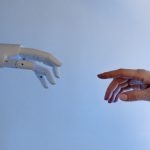Kevin Roose, New York Times columnist and author of Futureproof: 9 Rules for Humans in the Age of Automation, joins Chris Duffy to discuss how AI and automation are reshaping work and behavior. He explains that no occupation is immune to automation because AI can replicate routine tasks across industries once considered safe; journalism, art, music, and customer service among them. Rather than competing with machines, Roose argues for amplifying what makes people distinctly human: creativity, empathy, and judgment. He calls this leaving “handprints,” or making work feel authentically human instead of algorithmic.
The conversation dives into algorithmic bias, where AI systems trained on flawed historical data can reinforce inequality in areas like hiring and policing. Roose warns that humans often outsource judgment to machines, trusting algorithmic ratings more than their own instincts. He advocates reclaiming agency by adding “friction” into daily tech use, turning off autoplay, slowing purchases, and choosing intentional engagement over autopilot consumption.
Roose also discusses his own AI-assisted writing experiment and how creative work is entering a new phase of human–machine collaboration. As a new parent, he reflects on raising children in a digital world, encouraging creation over passive scrolling and caution over addiction. He remains a tech optimist, believing we can use automation to free people from repetitive tasks and create a more abundant society if we stay active participants in shaping its future. His core message: the goal is not to outperform machines, but to stay human enough that they can never replace us.




